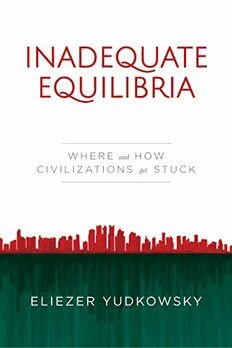
Inadequate Equilibria: Where and How Civilizations Get Stuck PDF
Preview Inadequate Equilibria: Where and How Civilizations Get Stuck
Inadequate Equilibria Where and How Civilizations Get Stuck ELIEZERYUDKOWSKY WrittenbyEliezerYudkowsky Publishedin2017bythe MachineIntelligenceResearchInstitute Berkeley94704 UnitedStatesofAmerica intelligence.org CoverartworkanddesignbyJimmyRintjema InadequateEquilibriaislicensedunderCreativeCommons Attribution-NonCommercial-ShareAlike4.0International. cc BY-NC-SA4.0 ISBN-13: 978-1-939311-19-1 ii Contents PrefaceandAcknowledgments iv 1. InadequacyandModesty 1 2. AnEquilibriumofNoFreeEnergy 18 3. Moloch’sToolbox 41 4. LivinginanInadequateWorld 95 5. BlindEmpiricism 114 6. AgainstModestEpistemology 127 7. StatusRegulationandAnxiousUnderconfidence 141 Conclusion 160 iii Preface and Acknowledgments InadequateEquilibriaisabookaboutageneralizednotionofefficientmarkets, and how we can use this notion to guess where society will or won’t be effectiveatpursuingsomewidelydesiredgoal. Anefficientmarketisonewheresmartindividualsshouldgenerallydoubt thattheycanspotoverpricedorunderpricedassets.Wecanaskananalogous question,however,aboutthe“efficiency”ofotherhumanendeavors. Suppose,forexample,thatsomeonethinkstheycaneasilybuildamuch better and more profitable social network than Facebook, or easily come upwithanewtreatmentforawidespreadmedicalcondition. Shouldthey questionwhatevercleverreasoningledthemtothatconclusion,inthesame waythatmostsmartindividualsshouldquestionanycleverreasoningthat causes them to think AAPL stock is underpriced? Should they question whethertheycan“beatthemarket”intheseareas,orwhethertheycaneven spotmajorin-principleimprovementstothestatusquo? How“efficient,”or adequate,shouldweexpectcivilizationtobeatvarioustasks? Therewillbe,asalways,goodwaysandbadwaystoreasonaboutthese questions;thisbookisaboutboth. Ithinkthatgeneralizednotionsofeffi- ciencyaretheprimarykeytogoodreasoningaboutthesereal-lifequestions. Anditisoftenwisertospendmoretimethinkingaboutgoodreasoningthan badreasoning,andtolaythegoodfoundationsfirst. Sogeneralizednotions ofefficiencyandinefficiencytakepriorityinexplanation;theyarethetopic ofthefirsthalfofthisbook. Thesecondhalfofthisbookwillthendelveintobackgroundquestions ofmindsetandmethodologygoingintoinadequacyanalysis,andwaysthat thisanalysiscangowrong,particularlyfortheunderconfident. Several of my co-workers have been invaluable to the task of editing this book: Rob Bensinger, Matthew Graves, Jimmy Rintjema, and Nate iv Soares. IamalsogratefultoScottAaronson,MichaelArc,StuartArmstrong, BryanCaplan,AndrewCritch,SpencerGreenberg,RobinHanson,Roxanne Heston,BenHoffman,HoldenKarnofsky,MichaelKeenan,DanKeys,Peter McCluskey,Alex Mennen, Luke Muehlhauser,Toby Ord,Anna Salamon, BuckShlegeris,CarlShulman,AlyssaVance,QiaochuYuan,andthemany other thoughtful reviewers who provided comments and critiques. Any remaininginadequaciesinthisvolumearemyown. —EliezerYudkowsky September2017 v 1. Inadequacy and Modesty Thisisabookabouttwoincompatibleviewsontheage-oldquestion:“When shouldIthinkthatImaybeabletodosomethingunusuallywell?” These two viewpoints tend to give wildly different, nearly cognitively nonoverlapping analysesofquestionslike: • MydoctorsaysIneedtoeatlessandexercise,butalotofeducated- sounding economics bloggers are talking about this thing called the “Shangri-LaDiet.”They’resayingthatinordertoloseweight,allyou needtodoisconsumelargequantitiesofflavorless,high-caloriefoods atparticulartimesofday;andtheyclaimsomeamazingresultswith thisdiet. Couldtheyreallyknowbetterthanmydoctor? WouldIbeable totelliftheydid? • Mydayjobisinartificialintelligenceanddecisiontheory.AndIrecall thedarkdaysbefore2015,whentherewasplentyofeffortandattention goingintoadvancingthestateoftheartinAIcapabilities,butalmost none going intoAI alignment: better understandingAI designs and goals that can safely scale with capabilities. Though interest in the alignmentproblemhassinceincreasedquiteabit,itstillmakessenseto askwhetheratthetimeIshouldhaveinferredfromthelackofacademic activity that there was no productive work to be done here;since if therewerereachablefruits,wouldn’tacademicsbetakingthem? • ShouldItrymyhandatbecominganentrepreneur? Whetherornot it should be difficult to spot promising ideas in a scientific field, it certainlycan’tbeeasytothinkupaprofitableideaforanewstartup. WillIbeabletofindanygoodideasthataren’talreadytaken? 1 • Theeffectivealtruismcommunityisanetworkofphilanthropistsand researchersthattrytofindtheverybestwaystobenefitothersperdollar, infullgenerality. Whereshouldeffectivealtruismorganizationslike GiveWell expect to find low-hanging fruit—neglected interventions ripe with potential? Where should they look to find things that our civilizationisn’talreadydoingaboutaswellascanbedone? WhenIthinkaboutproblemslikethese,Iusewhatfeelstomelikeanatural generalization of the economic idea of efficient markets. The goal is to predictwhatkindsofefficiencyweshouldexpecttoexistinrealmsbeyond themarketplace,andwhatwecandeducefromsimpleobservations. Forlack ofabetterterm,Iwillcallthiskindofthinkinginadequacyanalysis. Towardtheendofthisbook,I’lltrytorefuteanalternativeviewpoint that is increasingly popular among some of my friends,one that I think is ill-founded.ThisviewpointistheoneI’vepreviouslytermed“modesty,”and themessage of modestytends to be: “Youcan’t expect to beable to do X thatisn’tusuallydone,sinceyoucouldjustbedeludingyourselfintothinking you’rebetterthanotherpeople.” I’llopenwithacherry-pickedexamplethatIthinkhelpshighlightthe differencebetweenthesetwoviewpoints. i. Ioncewroteareport,“IntelligenceExplosionMicroeconomics,”thatcalled foranestimateoftheeconomicgrowthrateinafullydevelopedcountry— that is, a country that is no longer able to improve productivity just by importingwell-testedinnovations. Afootnoteofthepaperremarkedthat eventhoughJapanwasthecountrywiththemostadvancedtechnology—e.g., theircellphonesandvirtualrealitytechnologywerefiveyearsaheadofthe restoftheworld’s—Iwasn’tgoingtouseJapanasmyestimatorfordeveloped 2 economicgrowth,because,asIsawit,Japan’smonetarypolicywasutterly deranged. Roughly,Japan’scentralbankwasn’tcreatingenoughmoney. Iwon’tgo intodetailshere. Afriendofmine,andoneofthemostcarefulthinkersIknow—let’scall him“John”—madeacommentonmydrafttothiseffect: Howdoyouclaimtoknowthis? Icanthinkofplentyofother reasonswhyJapancouldbeinaslump: thecountry’sshrinking andagingpopulation,itslowfemaleworkplaceparticipation,its highlevelsofproductmarketregulation,etc. Itlookslikeyou’re venturingoutsideofyourareaofexpertisetonogoodend. “How do you claim to know this?” is a very reasonable question here. As Johnlaterelaborated,macroeconomicsisanareawheredatasetstendtobe thinandpredictiveperformancetendstobepoor.AndJohnhadpreviously observed me making contrarian claims where I’d turned out to be badly wrong,likeendorsingGaryTaubes’theoriesaboutthecausesoftheobesity epidemic. More recently, John won money off of me by betting that AI performanceoncertainmetricswouldimprovefasterthanIexpected;John hasagoodtrackrecordwhenitcomestospottingmymistakes. It’salsoeasytoimaginereasonsanobservermighthavebeenskeptical. I wasn’tmakingupmycritiqueofJapanmyself;Iwasreadingothereconomists anddecidingthatItrustedtheoneswhoweresayingthattheBankofJapan wasdoingitwrong……Yetonewouldexpectthegoverningboardofthe BankofJapantobecomposedofexperiencedeconomistswithspecialized monetaryexpertise. Howlikelyisitthatanyoutsiderwouldbeabletospot anobviousflawintheirpolicy? Howlikelyisitthatsomeonewhoisn’ta professionaleconomist(e.g.,me)wouldbeabletojudgewhicheconomic critiquesoftheBankofJapanwerecorrect,orwhichcriticswerewise? Howlikelyisitthatanentirecountry—oneoftheworld’smostadvanced countries—wouldforegotrillionsofdollarsofrealeconomicgrowthbecause theirmonetarycontrollers—notpoliticians,butappointeesfromtheprofes- 3
